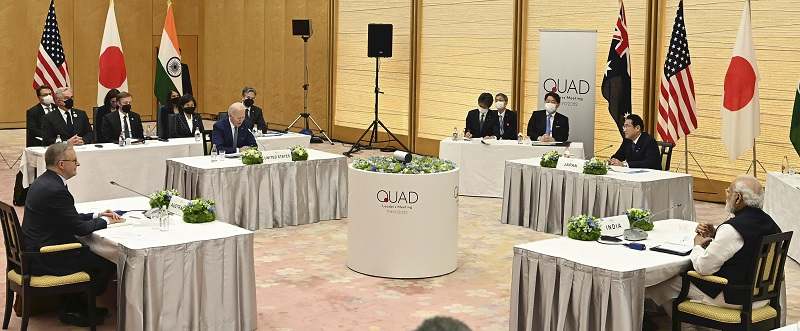
From left: Australian Prime Minister Anthony Albanese, U.S. President Joe Biden, Prime Minister Fumio Kishida, and Indian Prime Minister Narendra Modi attend the Quad summit held at the Prime Minister’s Office in Tokyo on Tuesday.
21:04 JST, May 25, 2022
With the international order shaken by Russia’s invasion of Ukraine and China’s hegemonic actions, the recent Quad summit in Tokyo was an opportunity for its leaders to demonstrate solidarity by showing the world they are committed to a “free and open Indo-Pacific.” This includes India, which has traditionally pursued omnidirectional diplomacy.
“India joined us in expressing our concern about the tragic conflict in Ukraine,” Prime Minister Fumio Kishida said at a press conference Tuesday following the summit. “We were able to strongly convey from Tokyo to the world the commitment made by the four of us to work toward the realization of a ‘free and open Indo-Pacific.’”
The leaders declared in a joint statement that with “a tragic conflict raging in Ukraine, we are steadfast.” They expressed support for the peaceful settlement of disputes, but did not criticize Russia by name. If the leaders had singled out Russia, India might have tried to distance itself from the other Quad nations, as it has a historically deep relationship with Moscow. This could have prevented the release of the joint statement.
The Quad is partly aimed at restraining China, which has been making aggressive maritime advances in the East and South China seas.
With Japan, the United States and countries in Europe having to conduct “operations on two fronts” in dealing with China and Russia, the Quad is also a valuable framework to deepen cooperation with India, the only Quad member that is not allied with the United States.
“It’s important to rack up whatever agreements we can, to link India with [the democratic camp] and keep the country closer to us,” a senior Foreign Ministry official said.
‘De facto security cooperation’
The United States views China as its most important strategic rival and positions the Quad as the core of its Indo-Pacific strategy, as it has become difficult for Washington to cope with Beijing single-handedly.
Since its first summit, conducted online in March last year, the Quad’s members have advanced cooperation in such areas as the economy and emerging technologies, which do not emphasize the issue of security.
Nevertheless, the United States had led the agreements in such areas as maritime domains, outer space and cyberspace, which can be seen as “de facto security cooperation,” according to a source connected to Japan-U.S. relations.
At the latest summit, Washington focused on the establishment of a new initiative, the Indo-Pacific Partnership for Maritime Domain Awareness (MDA).
Although the United States has the world’s largest network of satellites in orbit, it has relatively little information regarding regions far away from the U.S. mainland. With the MDA initiative, it will be able to beef up its surveillance, for instance, by detecting suspicious vessels in waters where China is increasing its maritime advances.
A high-ranking U.S. government official said information concerning the ocean areas of the Pacific Islands, Southeast Asia and the Indian Ocean will be integrated, and that it will serve as an important tool for each country in these regions to maintain its sovereignty.
The U.S. government has struggled to deal with India, which has not joined the U.S.-led group of countries imposing sanctions against Russia, but it shares Japan’s assessment that India’s cooperation is indispensable when dealing strategically with China. U.S. President Joe Biden held talks with Indian Prime Minister Narendra Modi on Tuesday, during which Biden said he was committed to making the Indo-U.S. partnership “among the closest we have on Earth.”
Keeping ASEAN in mind
The Quad can also be the starting point for strengthening broad regional cooperation in the Indo-Pacific, including the Association of Southeast Asian Nations and the Pacific Island nations.
“We will listen to the voices of countries in the region, such as those of ASEAN, South Asia and the Pacific Islands, and advance our cooperation,” Kishida said during the Quad summit.
China has also been increasingly approaching the ASEAN and the Pacific Island nations, utilizing economic assistance and other measures. The United States understands ASEAN’s importance, but ASEAN is wary of becoming a stage for the U.S.-China hegemonic rivalry.
A senior Japanese government official said, “It would be easier to win their understanding by reinforcing cooperation through the Quad, which doesn’t have as strong an atmosphere of security.”
Tajima is a Yomiuri Shimbun Washington correspondent.
Top Articles in World
-

Israeli Ambassador to Japan Speaks about Japan’s Role in the Reconstruction of Gaza
-

China Eyes Rare Earth Foothold in Malaysia to Maintain Dominance, Counter Japan, U.S.
-

North Korea Possibly Launches Ballistic Missile
-

Chinese Embassy in Japan Reiterates Call for Chinese People to Refrain from Traveling to Japan; Call Comes in Wake of ¥400 Mil. Robbery
-

Pentagon Foresees ‘More Limited’ Role in Deterring North Korea
JN ACCESS RANKING
-

Japan Institute to Use Domestic Commercial Optical Lattice Clock to Set Japan Standard Time
-

Israeli Ambassador to Japan Speaks about Japan’s Role in the Reconstruction of Gaza
-

Man Infected with Measles May Have Come in Contact with Many People in Tokyo, Went to Store, Restaurant Around When Symptoms Emerged
-

China Eyes Rare Earth Foothold in Malaysia to Maintain Dominance, Counter Japan, U.S.
-

Prudential Life Insurance Plans to Fully Compensate for Damages Caused by Fraudulent Actions Without Waiting for Third-Party Committee Review






















